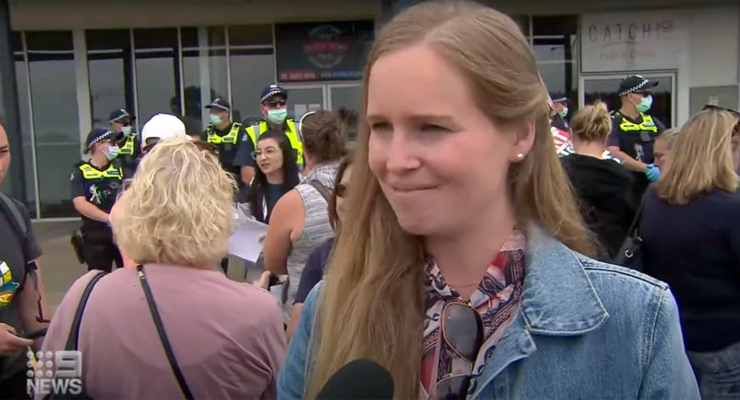
Journalism academics in Victoria were disappointed when Monica Smit, the public face of prominent anti-vaccine group Reignite Democracy Australia, decided not to pursue a defence that she was a journalist when she defied lockdown orders to attend anti-lockdown protests in Melbourne.
At the height of the public protests, Smit had marched with the crowds while repeatedly telling her livestream that she was a journalist, even though she later made video admissions that she was using the journalist exemption as a “loophole”.
Last week Smit was found guilty of breaching public health orders on August 21 2021, but no conviction was recorded as she had spent 22 days in jail.
The case brought back into focus the question of who is a journalist in 2023, a question exacerbated in recent years with the ease of use of livestream technologies and rise of “independent”, “new media” or “citizen” journalists who range from Real Rukshan to Friendlyjordies.
Julian Assange, who languishes in a UK prison, is sometimes included in this list, as his classification as a journalist — rather than a whistleblower or publisher — has for many years divided traditional journalists. Although accepted by the Media Entertainment and Arts Alliance (MEAA), the journalists’ union and his supporters as a journalist, there is still a large number of working journalists who say he is not.
How to define journalism
In our roles as heads of journalism at Monash University and RMIT University, we were called as expert witnesses in the lockdown avoidance case, together with the MEAA’s Adam Portelli. In our prepared statements, we relied on S126J of the Victorian Evidence Act (2008), which has been widely cited by press freedom advocate Peter Greste.
Since becoming an academic, Greste has spent much time examining this issue and has written about who is a journalist and how to define journalism. He points out the Victorian Evidence Act starts in the traditional way, declaring a journalist to be “a person engaged in the profession or occupation of journalism”. But the critical bit is at the end, where it says:
The person or the publisher of the information, comment, opinion or analysis is accountable to comply (through a complaints process) with recognised journalistic or media professional standards or codes of practice.
That is where we sit, arguing that a journalist in 2023 must adopt principles of good, ethical practice and professional standards — presenting all sides fairly, not advocating for a specific group or interest — and signing up to a code of conduct.
Rights and responsibilities
The most widely used professional standards and codes journalists use are the MEAA’s journalist code of ethics and the Australian Press Council’s statement of general principles.
We agree journalists must adhere to a code that contains a complaint procedure, and ideally in Australia provide evidence of training or education in the ethics, rights and responsibilities of a journalist.
The problem is that not all journalists sign up for a university degree or cadet training where they are provided with an education in the special rights and responsibilities that come with the job. Those special rights include getting physical access to spaces and buildings where the public is not readily permitted, and being able to benefit from certain legal defences and protections — such as for the dissemination of news as a defence to copyright infringement, and the public interest defence in defamation proceedings.
But with those rights and special treatment, there also comes responsibility, including accountability, such as a complaints system where journalists are held to account to undertake their activities consistently with integrity, transparency, fairness and independence.
Law and ethics test
For this reason, we are arguing the federal government’s Privacy Act review should consider a voluntary professional accreditation of journalists in Australia, in the same way it exists for professions such as certified practising accountants and engineers. The key is “voluntary”.
In our proposed scheme, a certified Australian journalist would have to sit and pass a journalism and publishing law and ethics test.
The advantages are threefold: it’s a way to rebuild the public’s trust in journalism by signalling a serious commitment to ethical practice, especially if most practising journalists in Australia chose to be certified; it’s a concrete way to lift the quality — and trust in — journalism in Australia; it would address longstanding concerns held by governments, the corporate sector and the judiciary that journalists are not serious about ethical practice.
In our assessment, there are no disadvantages to such a system given it’s voluntary. The regime connects to the journalism/media exemption in the Privacy Act by dealing with the longstanding question: who is a journalist? By providing the answer: a journalist is a person, regardless of background and education, who adheres to the legal and ethical standards of journalistic practice and publishing.
We are not proposing that all journalists in media outlets be certified to be subject to the available news, journalism or media exemptions in current laws, but we think that the option could be a useful, recommended (but not binding) complement to the privacy standards regime, and make the availability of exemptions much clearer. In turn, it would promote higher standards generally.
The next question is: who would administer the system? For many reasons we argue it needs to be independent of the media industry/the corporate sector, governments, unions and any other stakeholders. We are working on how this can be achieved.
Should journalists be certified to practise their craft in Australia? Let us know by writing to letters@crikey.com.au. Please include your full name to be considered for publication. We reserve the right to edit for length and clarity.









An obvious answer would be a chartered institution such as exists for many professions. The engineering profession in Australia, for example, has Engineers Australia. As it states on its website “Engineers Australia is the peak body for the engineering profession in Australia. The organisation was founded in 1919, as the Institution of Engineers Australia. With approximately 115,000 individual members, we are also the voice of the profession. For more than 100 years the work of the organisation along with its members has underpinned the progress of our nation. Our mission and vision for the future is to continue to advance the science and practice of engineering to benefit the community.” This fits with the voluntary nature of the proposed system for journalists because unlike some other professions, such as lawyers or medical doctors, engineering is not a protected profession. Anybody can say they are an engineer, but members of the engineers’ professional body are recognised as having met the professional standards set by that body.
That presumably includes a relevant university degree as necessary for entry – not the case for journalists.
I don’t know why you presume that. The entry standards would be set by the institution. The academic requirements, if any, would be up the institution and would be whatever it thought appropriate. Even those institutions that do typically require a degree usually have alternative routes to qualification, including in some instances setting their own examinations for those who do not have relevant academic qualifications from elsewhere.
How many ‘journalists’ would be left if they actually not only observed, but lived by and adhered to these ideals?
Too many of them now seem to think that their opinions/analysis shade any bigger picture.
… Then there’s the ‘M*rd*ch Effect’ – the media market share that such a pervasive, perverse behemoth uses to get what he wants …
Yes, the M*rd*ch Effect. How many talking heads and opinion piece writers are referring to themselves as journalists in that organization? I used to think that a journalist was someone who followed a story, gathered evidence, different accounts, weighed up information and evidence, and then wrote about their work, but hey, I’m kind of old fashioned.
The question is not so much how many journalists would be left, but where would they be published.
Not sure any definition is needed, because as it is, so many journalists and commentators are not across social science literacy including data, science & research process; the main issues are hollowed out media ownership ie. RW cartel, reach & influence across channels beyond previous decades, low standards and low quality.
“The person or the publisher of the information, comment, opinion or analysis is accountable to comply (through a complaints process) with recognised journalistic or media professional standards or codes of practice”………….
Well that rules out all or any publication by He Who Must Not Be Named.
“presenting all sides fairly”. In the case of climate change (among others), there is no other side. That is part of the problem in a lot of mainstream publications, looking for the ‘other side’
There should be recognition that presenting all sides fairly is not at all the same as presenting all side equally. A fair presentation of the climate change denial case would point out it has no credibility, the evidence refutes it and it is largely promoted by vested interests that are dangerous to the future of the planet and everything living on it.
“Fairly” is a word that carries too much colloquial meaning.
“Objectively” would be a better word to use.
However it is achieved, it would be wonderful to see an end to the requirement that journalists must always achieve balance (or whatever it may be called) by the ‘he said, she said’ method where each point of view is inevitably followed by its opposite, with no regard to facts or veracity.
Yes, this is why I think words like “balance” and “fairly” need to be avoided. They imply a moral obligation to a) try to find a positive light for all positions and b) treat them as equally valid.
Isn’t it ironic when the bleats about “left bias” blasts from a non democratic, vile olligarchical empire of nutjob ratbaggery.
Apart from radio and tv news and current affairs,I scan around 20 on-line journals/newsletters/papers daily reading those articles of particular interest. Most of the article/essays are written by experts rather than journalists. I find most journalists in Australia are poorly informed, self-opinionated, self-serving commentators. The ABC line-up is a very good example. From my observations, there are no hard and fast rules that adequately define and regulate “journalism”. Perhaps someone could name a few Australian journos with respect to truth, honesty, unbiased views, fact-checked, scientifically peer reviewed, etc…..